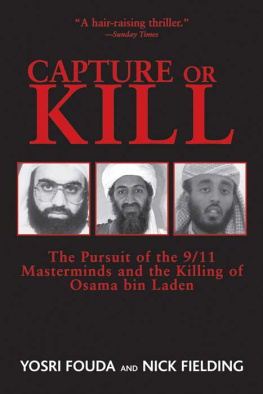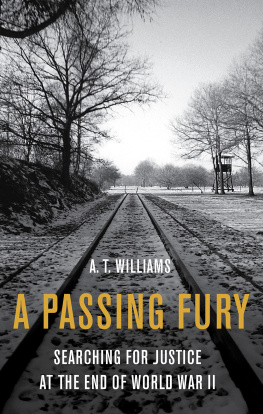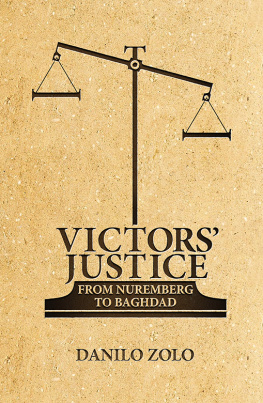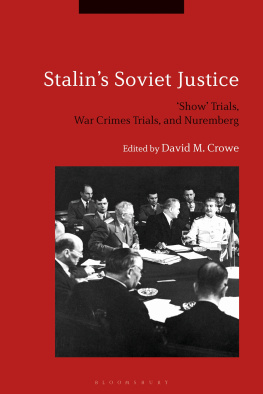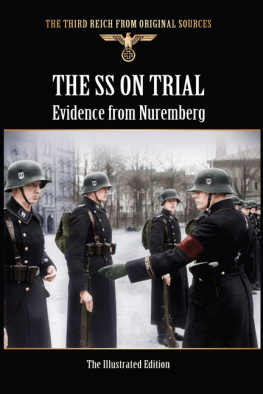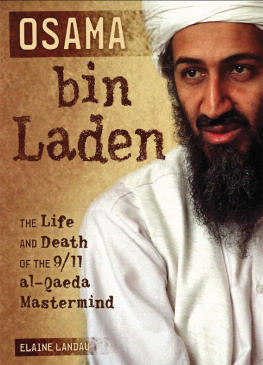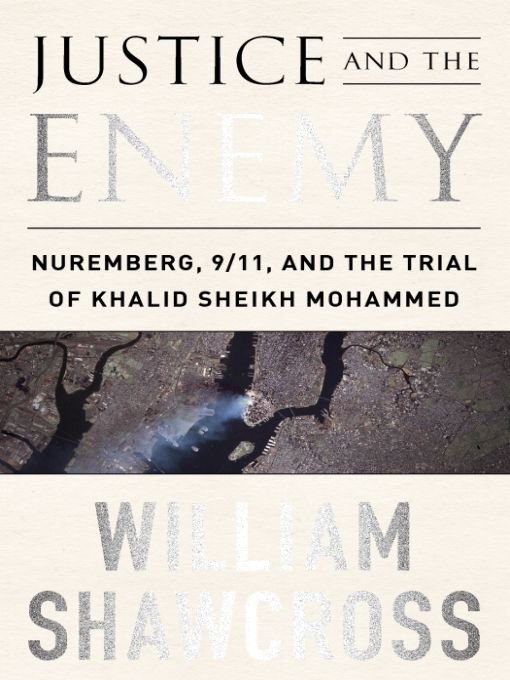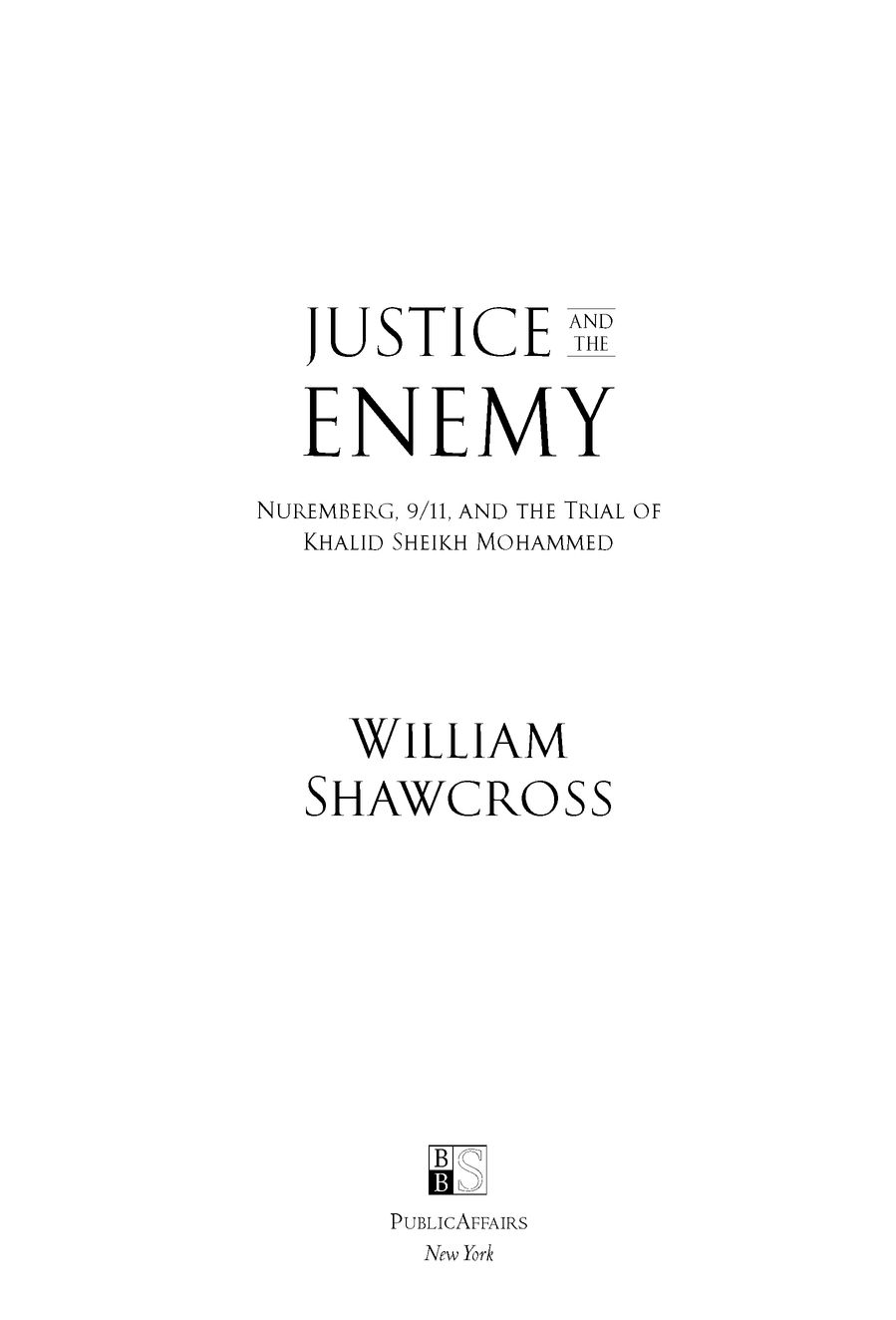Table of Contents
ALSO BY WILLIAM SHAWCROSS
Dubcek: Dubcek and Czechoslovakia 19181968
Crime and Compromise: Janos Kadar and the Politics of Hungary since Revolution
Sideshow: Kissinger, Nixon, and the Destruction of Cambodia
The Quality of Mercy: Cambodia, Holocaust, and Modern Conscience
The Shahs Last Ride: The Fate of an Ally
Murdoch: The Making of a Media Empire
Deliver Us from Evil: Warlords, Peacekeepers, and a World of Endless Conflict
Queen and Country
Allies: Why the West Had to Remove Saddam
Queen Elizabeth, The Queen Mother: The Official Biography
For Anthony Smith, constant friend
Salus populi suprema lex.
The safety of the people shall be the highest law.
Cicero, De Legibus, Book iii, sec. 3,
derived by tradition from the
Twelve Tables of Roman law
Laws are formed by the manners and exigencies of particular times, and it is but accidental that they last longer than their causes.
Samuel Johnson, Letter to James
Boswell, February 3, 1776
INTRODUCTION
THE JUDGMENT OF EVIL IS NEVER SIMPLE. When considering the case of Khalid Sheikh Mohammed, the so-called mastermind of the 9/11 attacks on America and of many other murders around the world, I recalled the work of the philosopher George Steiner, who has written at length on the consequences of Nazi crimes. In 1981, Steiner caused a sensation by creating a novellaThe Portage to San Cristobal of AHin which a group of Jewish Nazi hunters discover Hitler, deep in the Amazon jungle, three decades after the end of the Second World War. Many prominent Nazis had indeed fled to South America after their defeat in May 1945; the most important to be discovered was Adolf Eichmann, whom the Israelis kidnapped and spirited to Israel in 1960.
In Jerusalem, Eichmann was put on trial, found guilty, and hanged. Hannah Arendt, writing of that trial, famously spoke of the banality of evil. By this controversial phrase she did not mean that the evil acts of mass murder of Jews for which Eichmann was responsible were commonplace. Rather she felt that it was not the presence of hatred in Eichmann that drove him to send so many people to their deaths, but the absence of imagination. It was the juxtaposition of evil deeds and the failure to make judgments that Arendt called banal. Eichmann himself maintained after his arrest that he was merely following orders and that he had abdicated his conscience in order to follow the Fuhrerprinzip.
But that was not true. In 2011, the German news magazine, Der Spiegel published an investigation of Eichmann based on what it said were formerly confidential, secret and top-secret documents. These included taped conversations Eichmann had with friends in Buenos Aires before the Israelis caught him. On one occasion he boasted of his crimes, I was no ordinary recipient of orders. If I had been one, I would have been a fool. Instead, I was part of the thought process. I was an idealist. His only regret was in not having murdered all the Jews. We didnt do our work correctly, he said. There was more that could have been done.
In the case of the Fuhrer himself, Steiner began to wonder: what if Hitler, as well as Eichmann, had actually escaped his Berlin bunker, had gotten himself to Latin America, and had lived there, hidden, ever since? If, like Eichmann, he was finally discovered, how should he be dealt withhow should he be tried for his crimes?
Steiner, himself a refugee from Nazi Europe, had always been preoccupied by the power of language. He was haunted by an early 1920s photograph of Hitler standing like a beggar, with a torn raincoat in front of him, and no one is listening to him. But then ten people listened, and then a million.... Hitlers eloquence had been overwhelming and within ten years it had propelled him to be master of Germany and then of Europe and, had he, for example, decided to woo his Jewish atomic scientists, he might well have been master of everything.
Steiner began to write The Portage in 1975, at a time when stories of the horrors perpetrated by the Khmer Rouge were being reported by refugees from Cambodia. He asserted that the book sprang out of my thinking about the horror and terror of the Holocaust. I insist on this, because this novel is also about Cambodia and Vietnam, El Salvador and Burundi and so on. My feeling is that one has to grapple with the abyss if one can.
In the novella, the Jewish team discovers Hitler and starts to carry him out of the jungle to civilization. But rumors that the Fuhrer has been found flash around the world, as fast as was already possible in those innocent pre-Internet days. The powers who won the warthe United States, the Soviet Union, Britain, and Franceall begin to ponder the implications of Hitlers return. Fierce arguments begin over where and how he should be put on trialand under what jurisdiction. Deep in the jungle, Hitlers Israeli captors have similar debates. What should be done with him? Burn him at the stake? Set him free as a beggar in Israel itself?
In violent rainstor ms, the search partys radio breaks down. They have to decide whether to sit out the weather and then deliver Hitler as planned to San Cristobal, or whether the risk of their captive being stolen from them, either by some nation or some media emperor, is too great. They understand that once the world knows that Hitler is being brought out of the jungle, airfields will be dug, roads bulldozed through the trees. And a million television cameras. And a Hilton.... theyd come like locusts. And take him from us. Thats the whole point. Theyd take him to New York or Moscow or Nuremberg. And wed be lucky if they allowed us to stand in the anteroom peering over a million heads.
Instead, they decide to conduct their own trial, complete with judge, prosecution, and defense attorneys selected from their own party.
Remarkably, Steiner gives Hitler almost the last word: the climax of the book is Hitlers self-defense. It was from the Jews, he declares, that he learned everything. To set a race apart. To keep it from defilement. To hold before it a promised land.... My racism is a parody of yours, a hungry imitation. What is a thousand-year Reich compared with the eternity of Zion?
Steiners Hitler insists that he was not the originator of evil in our timeStalin, he points out, had perfected genocide when I was still a nameless scribbler in Munich. Stalin killed thirty million peoplefar more than he, Hitler. Our terrors were a village carnival compared with his. Our camps covered absurd acres; he had strung wire and death pits around a continent.... How many Jews did Stalin kill, your saviour, your ally Stalin? Answer me that... Stalin died in bed and the world stood hushed before the tigers rest. Whereas you hunt me down like a rabid dog, put me on trial (by what right, by what mandate?).
Finally, Hitler claims that he, the persecutor of the Jews, was also their benefactor; the Holocaust was the principal reason they were able to create Israel. Perhaps I am the Messiah... whose infamous deeds were allowed by God in order to bring His people home.
As his speech ends, Teku, the partys Indian tracker, leaps to his feet and shouts, with startling vagueness, Proved. As he does so, raucous drumbeats break the air above the clearing where the trial is taking place. The first helicopter from the ravenous world has arrived.


